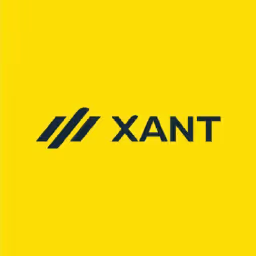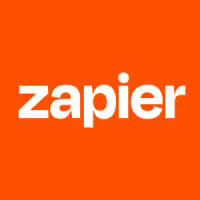Accord Alternatives
Find an alternative to Accord. This guide compares 10 tools based on features, pricing, and performance to help you decide.

Accord is a popular tool for good reason. It excels at creating mutual action plans, helping sales teams and customers stay aligned on next steps. This keeps complex deals organized and moving forward, which many users find very helpful for their process.
However, like any tool, it has limits. Some users mention a lack of integrations, limited features, or an overwhelming interface. We've analyzed the best alternatives based on G2 reviews to help you shortlist your options. Let's get started.
11x: Digital Workers for Your Sales Team
For teams that want to automate sales tasks, 11x provides digital workers to manage parts of the process. This is a relevant option if the main goal is to reduce repetitive work, not to manage shared customer plans.
At 11x, we use AI agents on our GTM platform to manage the sales process. Our agent Alice finds prospects, runs outreach, and updates your CRM. Julian qualifies inbound leads and books meetings. This approach replaces separate tools for data, outreach, and warmup.
Accord Alternatives
The following section details each alternative. We compare pricing, main features, and the specific advantages and drawbacks of each tool relative to Accord.
1) Rocketlane
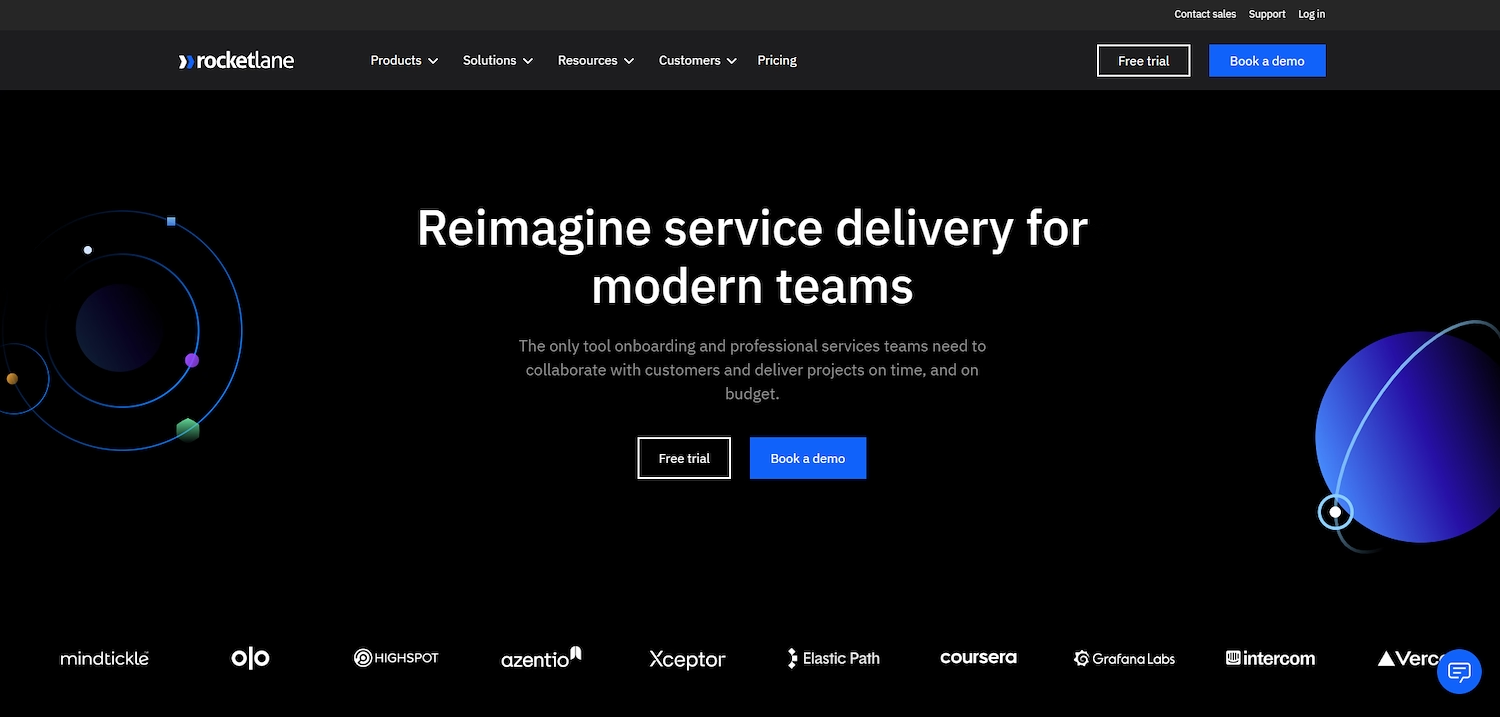
Rocketlane is a platform for post-sale activities like customer setup and project execution. It combines project management, customer collaboration, and financial tools into one workspace. The goal is to help teams deliver projects on schedule and within budget through shared portals and real-time health data.
This focus on the entire post-sale delivery process makes it a broader option than tools that only manage mutual action plans during the sales cycle.
Rocketlane's Main Features
- Offers tools for budgeting, tracking margins, and detecting revenue leaks with real-time cost insights and profitability dashboards.
- Provides capacity planning, forecasting, and utilization dashboards to analyze staffing against the project pipeline.
- Creates a branded external workspace for clients with interactive walkthroughs, chat, and automated CSAT surveys.
- Uses generative AI to write client updates, project documentation, and notes to reduce manual work.
How Rocketlane Compares to Accord
Average Review score: 4.7/5 stars based on 781 G2 reviews.
- Rocketlane manages the entire post-sale process, from customer onboarding to project delivery. This is a broader scope compared to Accord, which concentrates on mutual action plans within the sales cycle.
- It provides financial tools to track project budgets and profitability. Accord does not offer similar financial management features as its focus is on sales collaboration.
- The tool includes resource management features like capacity planning and utilization dashboards. This helps manage internal teams, a function outside of Accord's primary use case.
- A branded client portal offers customers real-time project status and a space for collaboration. This is more extensive than Accord's shared plans, as it is built for ongoing project delivery.
Where Accord Has an Edge Over Rocketlane
Rocketlane is built for post-sale project management. It does not have the same focus on mutual action plans for the sales cycle that Accord provides.
The tool's extensive features for post-sale activities might create a learning curve for some users. In comparison, Accord's specific focus on sales plans can feel more straightforward to adopt.
Some users report slow performance, which can be a drawback for teams that need quick updates. Accord's simpler scope may not present similar issues during a sales process.
Pricing and Value Comparison
Rocketlane prices per user, with its Essential plan at $19 per month, while Accord's Starter plan is $99 per month for 10 users. Accord's model is more cost-effective for teams of ten, but Rocketlane provides greater flexibility for smaller teams that don't need a 10-user block.
2) GuideCX
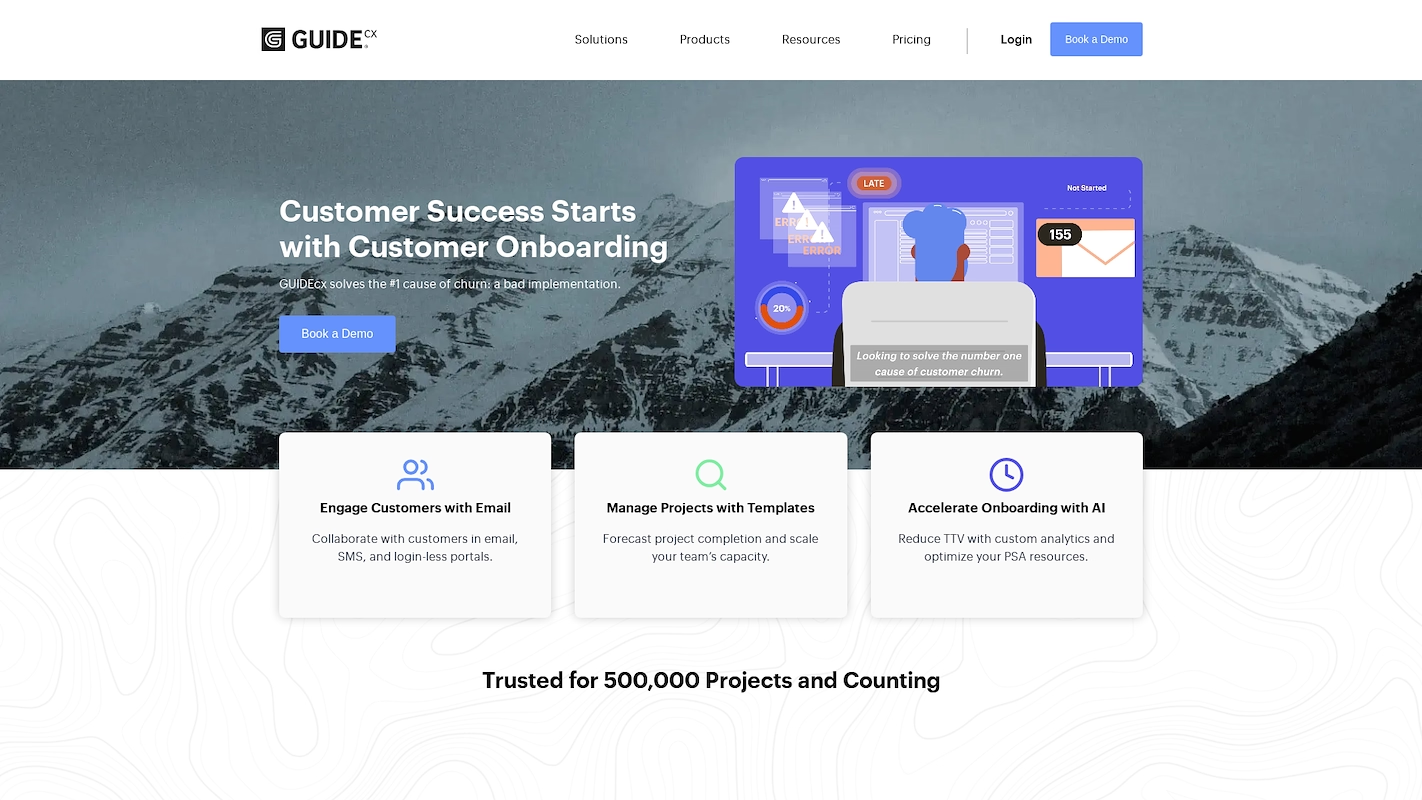
GuideCX is a client onboarding and implementation platform. It focuses on the post-sale process to reduce churn from poor customer setup. The tool uses login-free collaboration workspaces and AI forecasting to shorten time-to-value and keep projects on schedule.
It builds mutual action plans that define vendor and customer responsibilities. This gives all stakeholders visibility into project health and progress.
GuideCX's Main Features
- Uses AI-driven forecasting to predict project delays and provides dynamic end-date updates in real time.
- Engages customers through login-less portals and personalized, automated outreach via email and SMS at each onboarding step.
- Allows users to ask natural-language questions to build advanced reports and dashboards for project analysis.
- Offers live bandwidth insights to optimize resource allocation and balance team workloads.
How GuideCX Compares to Accord
Average Review score: 4.6/5 stars based on 456 G2 reviews.
- GuideCX centers on the entire client onboarding process, a broader scope than Accord's focus on sales-cycle action plans.
- It uses AI to forecast project delays and provides dynamic end-date updates, a predictive feature not found in Accord.
- The platform offers login-free portals, which simplifies customer access compared to Accord's user-based shared plans.
- It includes live bandwidth insights for resource allocation, an internal team management function that Accord does not have.
Where Accord Has an Edge Over GuideCX
- GuideCX is designed for post-sale client onboarding. This makes it less suitable for managing mutual action plans during the sales cycle, which is Accord's primary function.
- The tool's features are built for complex implementation projects. This can sometimes feel overwhelming for sales teams that only need to create shared action plans with prospects.
- Some users report that the initial setup process can be time-consuming. Accord's specific focus on sales plans may allow for a quicker implementation.
Pricing and Value Comparison
Accord's Starter plan is $99 per month for 10 users, while GuideCX starts at $4,700 per year for four licenses. Accord's monthly plan is more accessible for smaller teams, while GuideCX's annual model fits larger onboarding projects. You can check the detailed pricing on GuideCX's official website.
3) Dock
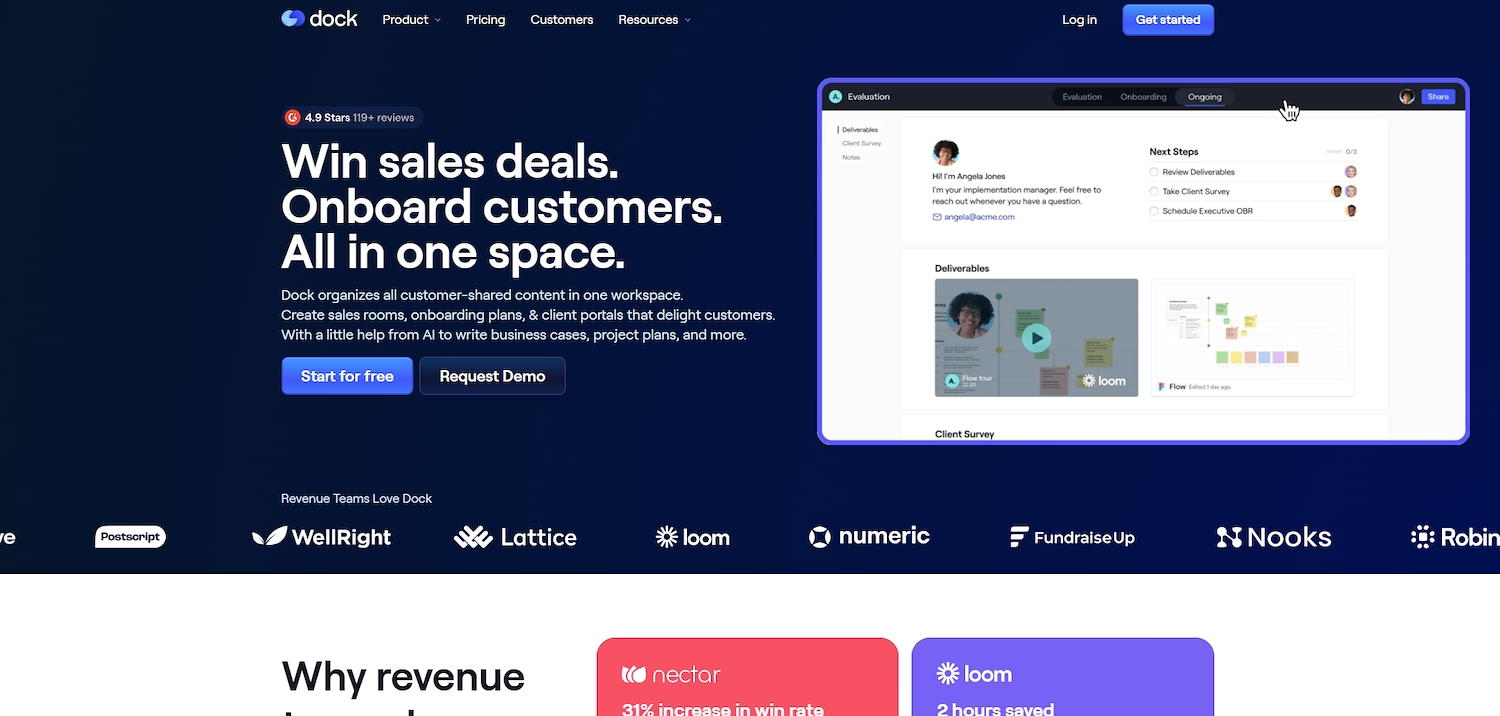
Dock is a customer-facing workspace platform that coordinates the revenue journey from first call to renewal. It places all collateral, project plans, and communication into a single branded space for the customer.
This creates a central hub for sales, customer setup, and client relations. The platform supports mutual action plans with shared tasks and due dates. AI assistance can also draft business cases and project plans.
Dock's Main Features
- Provides a central library to store, tag, and track sales and customer success collateral.
- Allows users to create, e-sign, and manage order forms and price quotes directly within a deal room.
- Delivers real-time analytics with buyer-intent notifications and customer health signals to improve forecast accuracy.
- Uses AI to generate drafts for business cases, project plans, meeting recaps, and executive summaries.
How Dock Compares to Accord
Average Review score: 4.9/5 stars based on 142 G2 reviews.
- Dock offers a unified workspace that covers the entire customer lifecycle, from the initial sale to renewal. This is different from Accord, which concentrates on mutual action plans for the sales process.
- It includes a central library to store, tag, and track sales and customer success collateral. Accord does not have a comparable built-in content management system.
- The tool allows users to create, e-sign, and manage order forms directly within a deal room. In comparison, Accord does not offer native e-signature or order form capabilities.
- It provides real-time analytics with buyer-intent notifications. This offers a different level of insight compared to Accord, which primarily tracks progress on shared action plans.
Where Accord Has an Edge Over Dock
- Dock offers fewer native integrations compared to Accord. This may require teams to use manual workarounds for tools that are not supported out of the box.
- Some users report a learning curve with Dock's extensive features. In contrast, Accord's specific focus on sales plans can be simpler for teams to adopt quickly.
- The tool's design covers the full customer lifecycle. This might be less suitable for teams that only need a dedicated tool for mutual action plans during the sales process.
Pricing and Value Comparison
Dock offers a free plan and per-user pricing, with its Starter plan at $49 per month. Accord's Starter plan is $99 per month for a block of 10 users, making Dock more accessible for individuals while Accord is more cost-effective for teams. For more details, check the pricing on Dock's official website.
4) Monday.com
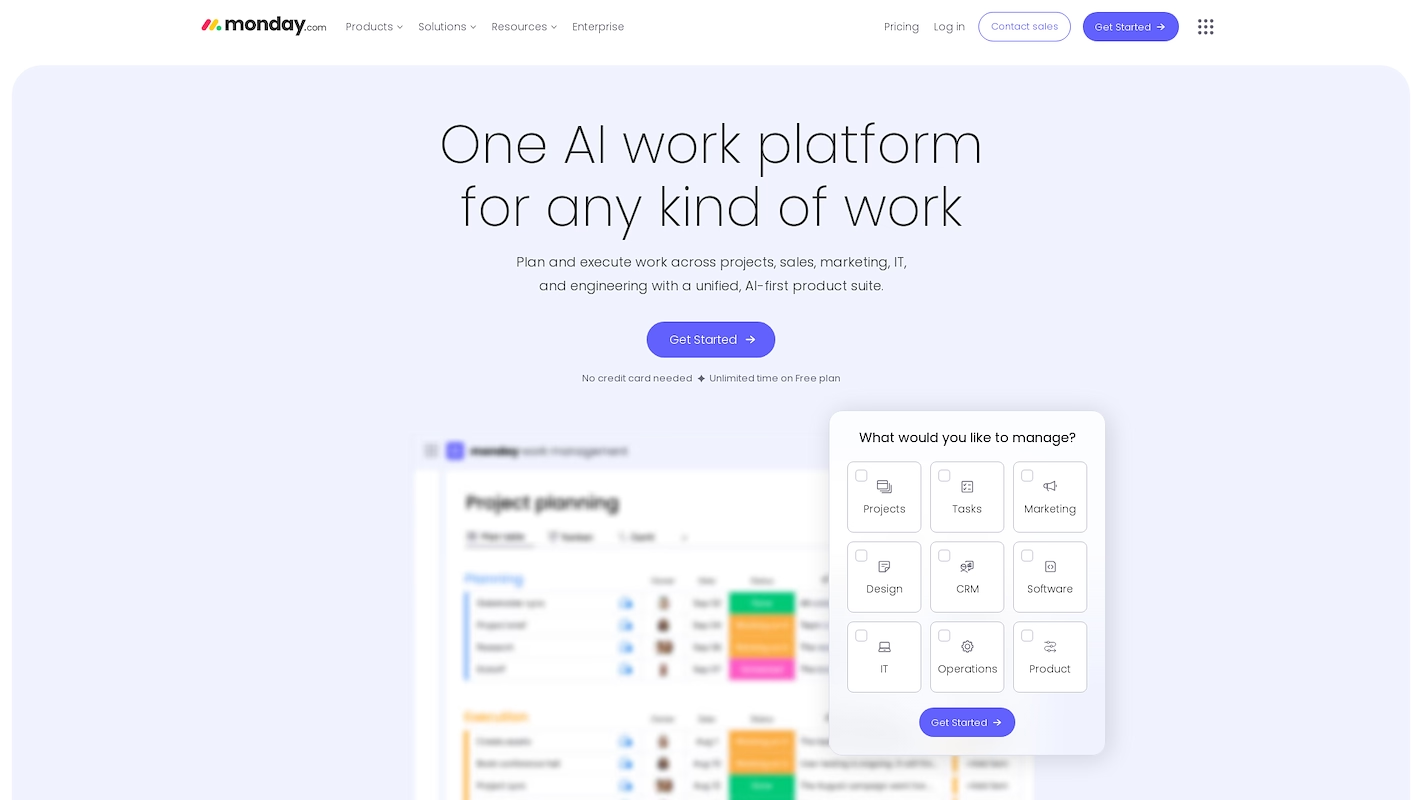
Monday.com is a Work OS where teams build custom workflow applications. It is a central platform for project and work management. For sales, it can create shared boards to track deal progress and tasks with a customer.
This configuration can function as a mutual action plan. It gives both sides visibility into the process, deadlines, and responsibilities. The platform's flexibility supports many use cases beyond sales.
Monday.com's Main Features
- Offers core products for different teams, including monday dev for agile sprints and monday service for IT service desks.
- Allows drag-and-drop customization to build custom boards, views, and dashboards.
- Features the mondayDB data engine for high-speed processing of large-scale data.
- Includes AI-driven workflows, with plans to add specialist AI agents and other advanced AI features.
How Monday.com Compares To Accord
Average Review score: 4.7/5 stars based on 13,641 G2 reviews.
- Monday.com is a full Work OS that supports custom workflows across different departments. This provides broader utility than Accord, which is built specifically for sales cycle action plans.
- It offers extensive drag-and-drop customization to build unique boards and dashboards. This gives teams more control over their workspace view compared to Accord's structured plan layout.
- The tool includes specialized products for non-sales teams, like monday dev for technical projects. Accord does not have this functional range, as it centers on sales collaboration.
- Its platform supports a high volume of integrations and automations. This allows it to connect more deeply into a company's tech stack than Accord's more focused integration set.
Where Accord Has an Edge Over Monday.com
- Monday.com is a general work platform that requires configuration for sales plans. In comparison, Accord provides a purpose-built environment for mutual action plans from the start, which can simplify adoption for sales teams.
- The platform's extensive customization options can sometimes create a learning curve. Some teams might find Accord's focused interface more straightforward for sales-cycle plans without a need for extensive initial setup.
- While Monday.com boards can be shared, the tool is not primarily designed as a customer-facing portal. Accord focuses entirely on the shared buyer experience, which can feel more intuitive for external stakeholders.
Pricing and Value Comparison
Accord's Starter plan is $99 per month for a block of 10 users, while Monday.com's Standard plan is $12 per user per month with a three-seat minimum. This makes Accord more cost-effective for a team of ten, but Monday.com offers greater flexibility for smaller teams. For detailed pricing, visit Monday.com's official website.
5) Asana
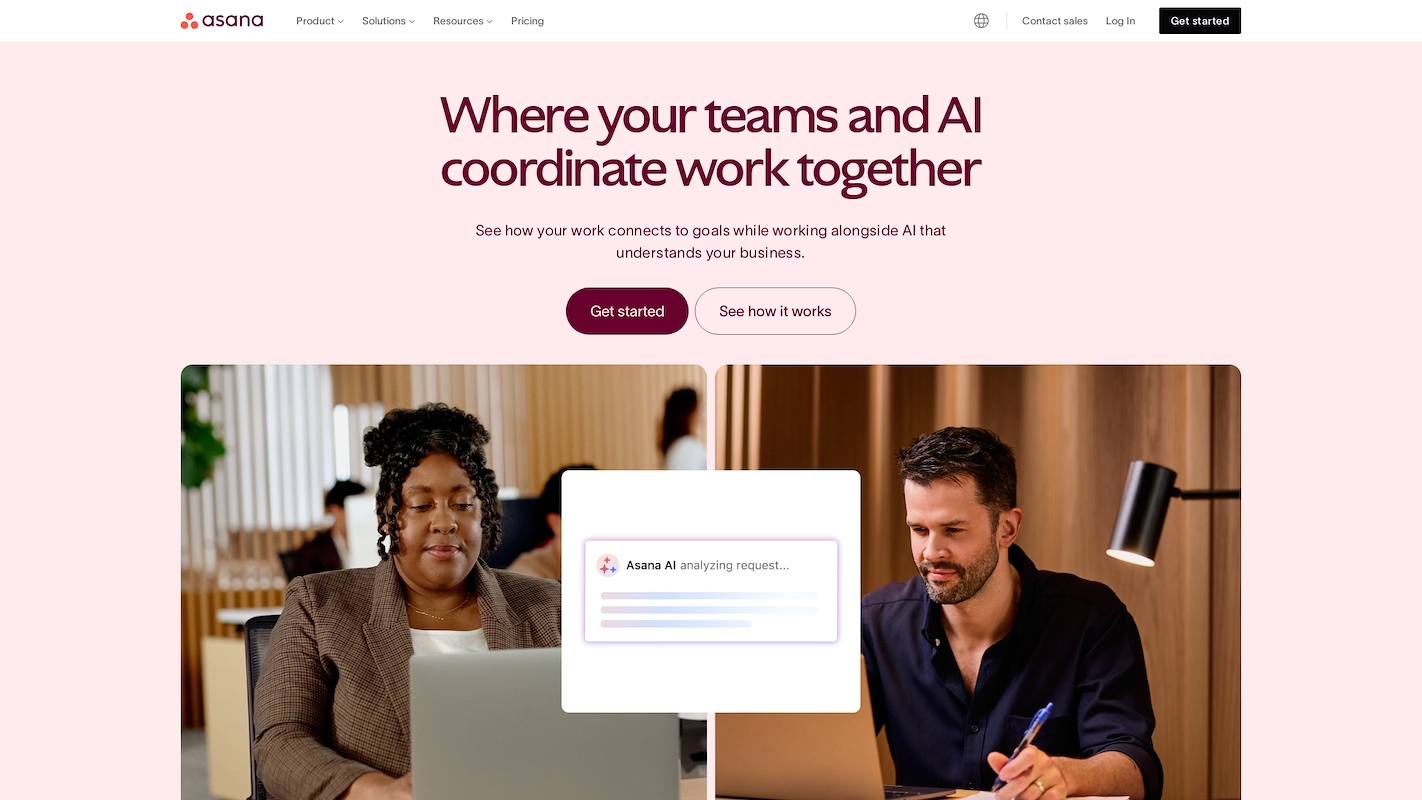
Asana is a work management platform that helps teams organize and track their work. For customer-facing projects, it can create shared plans that function as mutual action plans. These plans outline tasks, owners, and deadlines for all parties involved.
This gives both sides a clear view of progress. The platform's general design supports many use cases beyond customer collaboration.
Asana's Main Features
- Links individual tasks and projects to company-wide objectives and tracks progress using real-time dashboards.
- Provides resource management tools to visualize team workloads and manage staffing levels across projects.
- Automates processes with custom rules, forms, and approval workflows to standardize operations.
- Offers over 300 native integrations with tools like Microsoft Teams, Slack, and Salesforce.
How Asana Compares to Accord
Average Review score: 4.4/5 stars based on 12,182 G2 reviews.
- Asana functions as a general work management platform for many departments. This differs from Accord's specific focus on mutual action plans for the sales cycle.
- It connects individual tasks to company-wide goals. Accord, in comparison, tracks progress on shared sales plans without this direct link to broader company objectives.
- The tool provides resource management features to see team workloads. This helps manage internal staffing, a function outside of Accord's primary use case of customer collaboration.
- The platform offers a larger number of native integrations with tools like Salesforce and Slack. This allows for deeper connections into a company's tech stack compared to Accord's more focused set of integrations.
Where Accord Has An Edge Over Asana
- Asana is a general work platform that needs to be configured for sales use cases. Accord provides a purpose-built environment for mutual action plans, which can make the initial setup quicker for sales teams.
- The platform is primarily designed for internal use, so the customer-facing experience can sometimes feel less intuitive. Accord, in contrast, focuses entirely on creating a shared space for the buyer.
- Some users report that the platform's extensive features can create a learning curve. Accord's focused interface may feel more straightforward for teams that only need to manage sales-cycle plans.
Pricing and Value Comparison
Accord's Starter plan is $99 per month for a block of 10 users, while Asana's Starter plan is $10.99 per user per month. This makes Accord more cost-effective for a team of ten, but Asana's per-user model offers greater flexibility for smaller teams.
Consider 11x for Sales Automation
If your main goal is sales automation, 11x offers a different approach. Our digital workers manage prospect discovery, outreach, and CRM updates. This frees your sales team to focus on high-value tasks. Learn how 11x can support your GTM efforts.
At 11x, we use AI to manage your sales process. Our agent Alice finds accounts and runs outreach, while Julian qualifies leads and books meetings. This approach consolidates the GTM stack, replacing separate tools for data, outreach, and warmup.
Book a demo to see how it works.
6) ClickUp

ClickUp is a work platform that consolidates tasks, documents, and goals into one application. Teams can configure it to create shared project plans with customers. These plans serve as mutual action plans, with clear tasks and deadlines for both sides.
The platform's structure supports a wide range of use cases beyond sales, from software development to marketing campaigns.
ClickUp's Main Features
- The platform provides core work hubs that unite tasks, documents, chat, and whiteboards into a single application.
- It includes an AI suite, ClickUp Brain, with an AI writer and a search function that works across connected apps like Google Drive and Salesforce.
- The tool offers project management features for agile teams, such as sprints, milestones, roadmaps, and time tracking.
- It has built-in communication tools like real-time chat, comment-based proofing, and native screen recording.
How ClickUp Compares To Accord
Average Review score: 4.7/5 stars based on 10,388 G2 reviews.
- ClickUp functions as a broad work platform for many departments, while Accord concentrates on mutual action plans for the sales cycle.
- It includes an AI suite, ClickUp Brain, for tasks like writing and cross-app search, which offers different capabilities than Accord.
- The platform provides features for agile teams, such as sprints and roadmaps, which are functions outside of Accord's sales-focused scope.
- This tool has built-in communication options like real-time chat and screen recording, creating a different collaboration model than Accord's shared plans.
Where Accord Has an Edge Over ClickUp
- ClickUp is primarily an internal work management tool. Its customer-facing features can feel less intuitive for buyers compared to Accord, which designs its entire experience around external collaboration.
- The tool's all-in-one design includes many features not relevant to sales, like bug tracking. This may complicate the user experience, while Accord offers a clean interface focused only on sales collaboration.
- It requires users to build sales-specific workflows from scratch. In comparison, Accord includes pre-built templates and processes for mutual action plans, which can speed up adoption for sales teams.
Pricing and Value Comparison
Accord's Starter plan is $99 per month for a block of 10 users, while ClickUp's paid plans start at $7 per user per month.
ClickUp's per-user model offers more flexibility for smaller teams, while Accord's pricing can be more cost-effective for a team of ten.
7) Trello
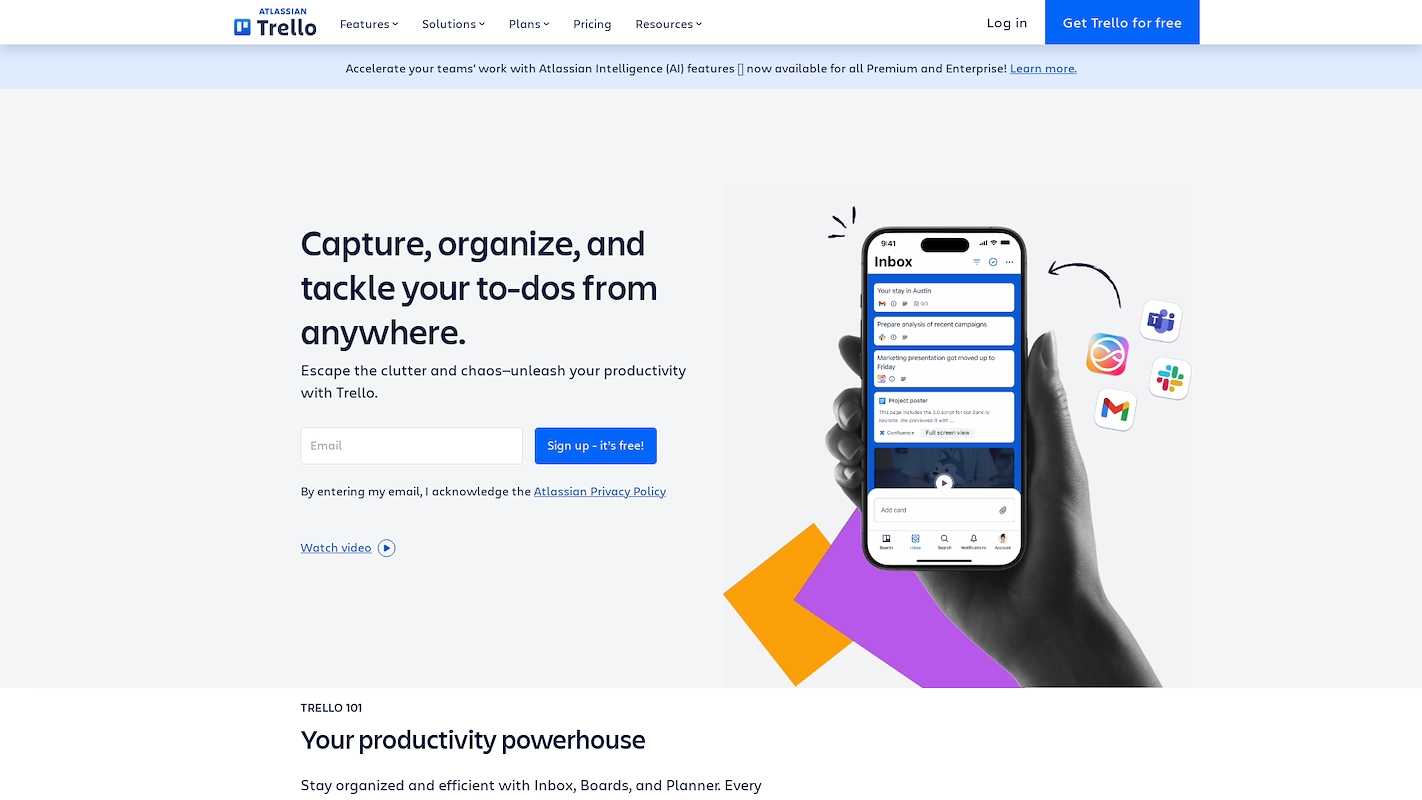
Trello is a visual tool that organizes work into boards. Teams use lists and cards to manage tasks and track project progress. For customer collaboration, a shared board can function as a mutual action plan. This gives both parties a clear view of tasks and deadlines.
The platform's simple structure supports various workflows. Teams use it for projects that range from marketing campaigns to software development. Its core function remains visual task management.
Trello's Main Features
- Offers no-code automation through Butler for recurring tasks, rule-based triggers, and workflow shortcuts.
- Provides a plugin framework, called Power-Ups, to add functionality like analytics and reporting to boards.
- Mirrors a single card across multiple boards so that all updates stay in sync.
- Includes Atlassian Intelligence to auto-summarize tasks and convert forwarded emails into structured cards.
How Trello Compares To Accord
Average Review score: 4.4/5 stars based on 13,707 G2 reviews.
- Trello uses a visual Kanban board with cards and lists to manage tasks. This is a different approach from Accord's structured layout, which is designed specifically for sales action plans.
- The tool's design is simple and visual, like organizing sticky notes. This can make it easier to adopt for general project tracking compared to Accord's purpose-built interface for sales plans.
- It offers more flexibility for different types of projects, from marketing to HR. Accord, in contrast, focuses only on creating mutual action plans for the sales cycle.
- The platform provides a framework of Power-Ups to add features like analytics or calendars to boards. This offers a different type of customization than Accord's more focused feature set for sales plans.
Where Accord Has An Edge Over Trello
- Trello is a general project management tool that teams must configure for sales plans. Accord, in contrast, offers a purpose-built environment for mutual action plans, which often makes the setup process quicker for sales teams.
- Its design focuses on internal team projects, so the customer-facing experience may feel less intuitive for buyers. Accord, in contrast, builds its entire platform around a shared space for external collaboration with customers.
- The platform lacks specific sales-oriented tools, such as analytics for buyer engagement. Accord includes these functions natively, which gives sales teams more specific insights into a deal's progress from the customer's side.
Pricing and Value Comparison
Accord's Starter plan is priced at $99 per month for a block of 10 users. Trello offers a free plan, with paid plans starting at $5 per user per month. Trello's per-user model is more flexible for smaller teams, while Accord's pricing can be more cost-effective for a team of exactly ten.
8) Planhat

Planhat is a customer platform that manages the post-sale lifecycle. It centralizes customer data and workflows for onboarding, adoption, and renewals. Teams use it to build collaborative project plans and customer portals.
This gives a shared view of tasks and goals to support the client relationship from sale to expansion.
Planhat's Main Features
- Calculates customer health scores and builds detailed customer profiles for monitoring.
- Uses predictive analytics to forecast potential customer actions and outcomes.
- Allows users to set up custom triggers that automate internal workflows and actions.
- Includes tools for data import and export, supported by API access for custom integrations.
How Planhat Compares To Accord
Average Review score: 4.6/5 stars based on 699 G2 reviews.
- Planhat calculates customer health scores to monitor account risk. Accord, in comparison, focuses on tracking progress within a sales plan and does not offer this feature.
- The tool uses predictive analytics to forecast customer actions. This offers a different kind of insight compared to Accord, which focuses on tracking the completion of tasks in a shared plan.
- It lets users create custom triggers to automate internal workflows based on customer data. This is a different type of automation than what Accord provides for managing sales plans.
- This platform builds detailed customer profiles by pulling in data from different sources. Accord creates a shared space for a specific deal rather than a central, long-term customer record.
Where Accord Has An Edge Over Planhat
- Planhat is built for the post-sale customer journey, such as onboarding and renewals. In comparison, Accord focuses only on the sales cycle, which provides a more direct tool for sales teams who do not need customer success features.
- Its features are designed for complex post-sale management, which some users find overwhelming for sales use cases. Accord provides a simpler, purpose-built interface for creating shared action plans with prospects that may require less setup.
- The platform is mainly for internal customer success teams to manage accounts. Accord, on the other hand, centers its entire experience on the external buyer, which can feel more natural for prospects who are part of a sales process.
Pricing and Value Comparison
Accord's Starter plan is $99 per month for a block of 10 users. Planhat does not list its pricing publicly, which typically indicates a custom quote model tailored to enterprise needs. For specific details, you should visit Planhat's official website.
9) Gainsight CS
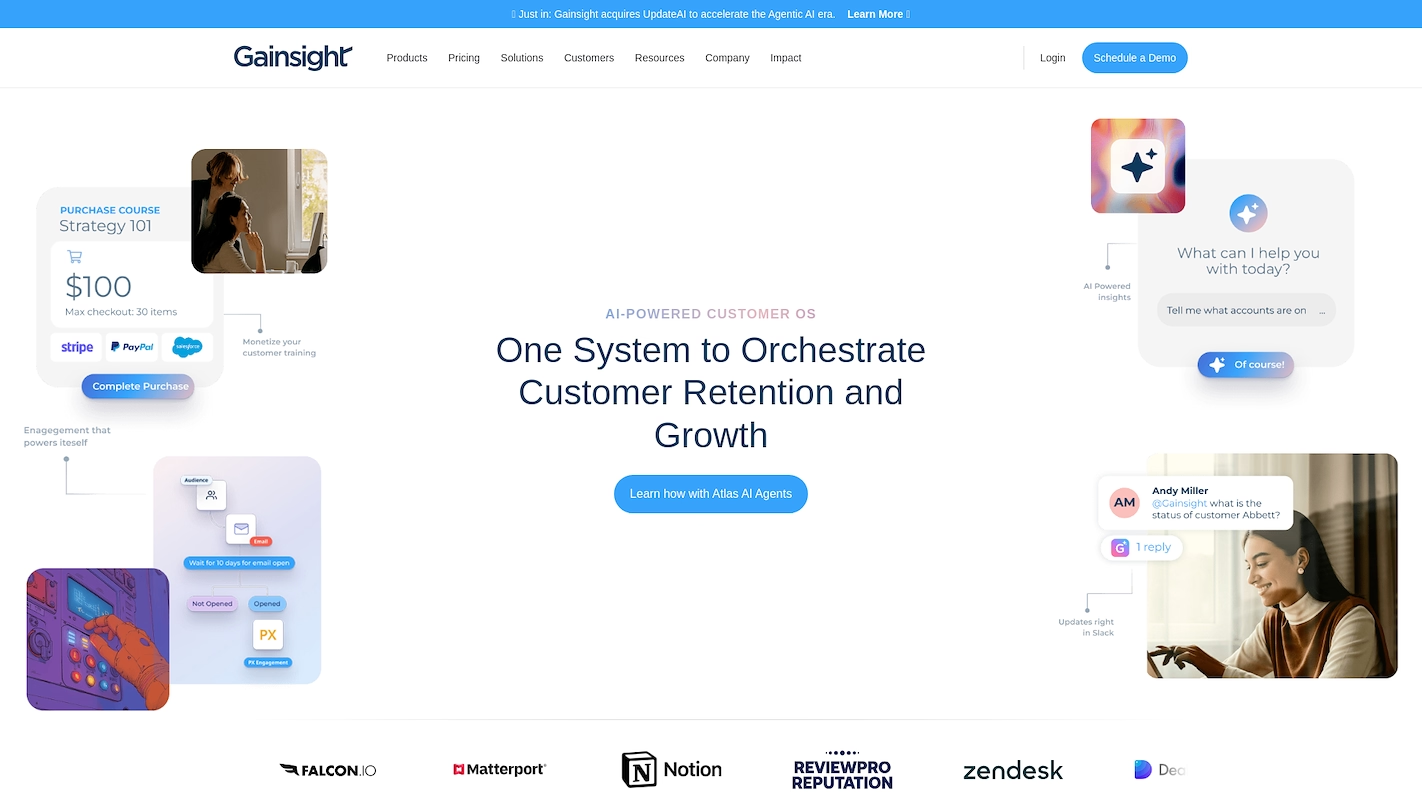
Gainsight CS is a customer success platform that manages the post-sale journey. Teams use it to build success plans that outline objectives and tasks for customer setup and adoption. These plans function as a shared roadmap for the company and its clients.
This provides all parties with a clear view of progress against key milestones. The tool focuses on the entire customer relationship after the initial purchase.
Gainsight CS's Main Features
- Calculates customer health scores to proactively identify and flag potential churn risks.
- Centralizes customer data into a single view to provide a comprehensive profile for each account.
- Offers playbooks and success plans to automate workflows and guide consistent team actions.
- Includes journey orchestration to automate customer engagement at different stages of the lifecycle.
How Gainsight CS Compares To Accord
Average Review score: 4.5/5 stars based on 1,614 G2 reviews.
- Gainsight CS calculates customer health scores to flag potential churn risks. Accord, in contrast, tracks progress on shared sales plans and does not offer this predictive monitoring.
- It provides automated playbooks and journey orchestration for post-sale activities. This is different from Accord, which centers on managing action plans during the sales cycle.
- The tool builds a complete customer profile by centralizing data from various sources. Accord creates a temporary, deal-specific workspace rather than a permanent customer record.
- This platform includes features to track expansion opportunities from existing customers, a function outside of Accord's scope, which focuses on closing the initial sale.
Where Accord Has An Edge Over Gainsight CS
- Gainsight CS is designed for customer success managers to handle post-sale activities. In comparison, Accord is built specifically for account executives to use during the sales cycle, which makes its workflow more aligned with their needs.
- The platform's extensive features for customer success can create a steep learning curve. Some users report that the initial setup is complex, while Accord's focused design for sales plans may allow for a quicker start.
- Gainsight CS is built for internal teams to manage long-term customer health. Accord, in contrast, creates a temporary, deal-specific workspace designed for the buyer, which can make the sales collaboration feel more focused for a prospect.
Pricing and Value Comparison
Accord's Starter plan is $99 per month for a block of 10 users, while Gainsight CS uses a custom quote model and does not list pricing publicly. For specific details, you should visit Gainsight's official website.
10) ClientSuccess
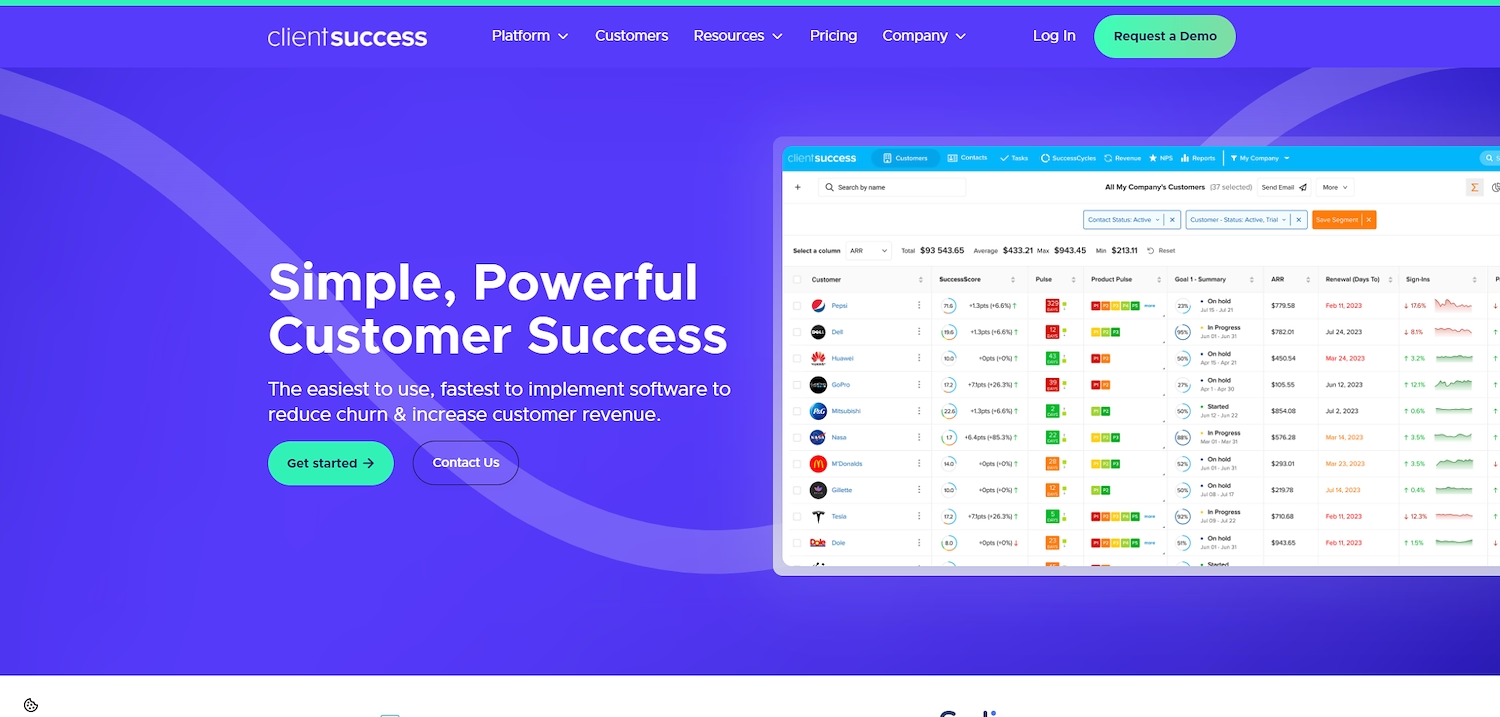
ClientSuccess is a customer success platform. It helps manage the post-sale journey, from customer setup to renewal. The tool uses success plans to define objectives and tasks for both the company and the customer.
This creates a shared roadmap for all parties. The focus is on the entire client relationship after the initial sale. This supports long-term account health and growth.
ClientSuccess's Main Features
- Calculates customer health scores to monitor accounts and identify churn risk.
- Uses predictive analytics to forecast potential customer outcomes.
- Centralizes customer information into detailed profiles for a complete account view.
- Offers data import and export tools, with API access for custom integrations.
How ClientSuccess Compares To Accord
Average Review score: 4.4/5 stars based on 422 G2 reviews.
- ClientSuccess calculates customer health scores to identify potential churn risk. Accord, in contrast, tracks task completion within a sales plan and does not offer this type of predictive monitoring.
- The tool uses predictive analytics to forecast potential customer outcomes. This provides a different kind of insight compared to Accord, which focuses on the progress of shared action plans.
- It centralizes customer information into detailed profiles for a complete account view. Accord creates a temporary, deal-specific workspace instead of a permanent customer record.
- The platform uses success plans to define long-term objectives for the entire customer journey. This is different from Accord, which builds mutual action plans specifically for the sales cycle.
Where Accord Has An Edge Over ClientSuccess
- ClientSuccess is designed for post-sale customer management. This makes it less aligned with the needs of sales teams who require a tool specifically for creating mutual action plans with prospects, which is Accord's primary function.
- The platform's features focus on long-term customer health, which can feel complex for sales teams. Some users might find Accord's simpler, purpose-built interface for sales plans quicker to set up and use during a deal cycle.
- This tool centers on internal teams managing customer accounts. In comparison, Accord designs its entire experience around the external buyer, which can feel more intuitive for prospects who are part of an active sales process.
Pricing and Value Comparison
Accord's Starter plan is $99 per month for a block of 10 users. ClientSuccess does not list its pricing publicly, which typically indicates a custom quote model tailored to enterprise needs. For specific details, you should visit ClientSuccess's official website.
Which One Should You Go With?
Choosing the right Accord alternative depends on your team's specific needs, from post-sale management to general project tracking. This guide reviewed several options to help you compare features and find the best fit for your process.
If your goal is to automate sales tasks rather than manage mutual action plans, 11x offers a different solution. Our digital workers handle prospecting, outreach, and lead qualification, which allows your sales team to focus on closing deals.



